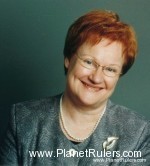Sauli Niinistö, President of the Republic of Finland (re-elected on Jan 28, 2018)
 Sauli Väinämö Niinistö (born 24 August 1948) is a Finnish politician of the National Coalition Party. He is the president-elect of Finland, and will assume office on 1 March 2012, becoming the first president from the National Coalition Party since Juho Kusti Paasikivi, who left office in 1956.
Sauli Väinämö Niinistö (born 24 August 1948) is a Finnish politician of the National Coalition Party. He is the president-elect of Finland, and will assume office on 1 March 2012, becoming the first president from the National Coalition Party since Juho Kusti Paasikivi, who left office in 1956.
Educated as a lawyer, Niinistö was Minister of Finance from 1996 to 2003 and the National Coalition Party candidate in the 2006 presidential election. He served as the Speaker of the Parliament of Finland from 2007 to 2011 and has been the Honorary President of the European People’s Party (EPP) since 2002. He is also President of the Football Association of Finland.
Niinistö was the National Coalition Party candidate in the 2012 presidential election. With 37.0% of the vote, he won the first round of the election and faced off against Pekka Haavisto of the Green League in the decisive second round. He carried the second round with around 62.6% against Haavisto’s 37.4%.
Born in Salo, Niinistö ran his own law firm in Salo before entering national politics.
Niinistö served on the municipal council of Salo from 1977 to 1992 and was elected a Member of the Finnish Parliament (Eduskunta) from the district of Finland Proper in 1987. In 1994 he was chosen to lead the National Coalition Party as the party chairman and subsequently became Justice Minister in Prime Minister Paavo Lipponen’s first cabinet in 1995.
Switching portfolios, Niinistö became Finance Minister in 1996, a place he held also in Lipponen’s second cabinet from 1999–2003. In both cabinets, the right wing Niinistö was deputy to social democrat Lipponen, thus enabling the use of the term rainbow government in reference to Lipponen’s two consecutive cabinets. As Finance Minister, Niinistö was known for his strict fiscal policy as well as his hobby of roller skating. Niinistö was urged by his party to stand for president in the elections of 2000, but he refused. Niinistö announced his gradual retirement from politics in 2001, a course of action he has not completely followed to date. He was succeeded that year by Ville Itälä as party leader. Upon the end of his term as a cabinet minister in 2003, Niinistö went on to become vice-chairman of the Board of Directors at the European Investment Bank.
In March 2005, Niinistö announced his candidacy for the Finnish Presidency. He represented the National Coalition Party, challenging the incumbent President Tarja Halonen. He qualified for the second round runoff (as one of the top two candidates in the first round), held on 29 January 2006, but was defeated by Tarja Halonen. Total funds for Niinistö’s 2006 president campaign were circa 2,225,000 euros, including 492,864 euros and 717,191 euros contributions from the National Coalition Party. Financial declaration in 2006 was made more detailed in 2009 because of campaign finance controversies in Finland.
In 2006, Niinistö announced that he was standing again for the Finnish parliamentary election. He said, however, that he had no plans to take any high-ranking political job like the prime ministership in the future. He received 60,498 personal votes in the 2007 elections, which is a record number of votes for one candidate in a Finnish parliamentary election. It was about 50% more than the earlier record of Hertta Kuusinen. After the 2007 election, Niinistö decided to take the respected position of the Speaker of the Parliament. Niinistö is also the Honorary President of the European People’s Party (EPP), having successfully negotiated the merger of the European Democrat Union (EDU) into the EPP in 2002.
Niinistö was elected as the president of the Football Association of Finland on 8 November 2009, replacing Pekka Hämäläinen.
Niinistö is supportive of tough fiscal reforms to plug the country’s deficit and make sure it retains its triple-A credit rating.
Niinistö was the National Coalition Party candidate for a second time in the 2012 presidential election. With 37.0% of the vote, he won the first round of the election and faced off against Pekka Haavisto of the Green League in the decisive second round. He carried the second round with around 62.6% against Haavisto’s 37.4%. In the 2012 presidential election Niinistö’s budget was circa 1.2 million euros. Niinistö won the election by a historically large margin. He won a majority in 14 of the country’s 15 electoral districts.
Niinistö has pledged to establish a special task force aiming at preventing alienation among the young and expressed concern about the problems of sparsely populated rural areas. Niinistö stressed the significance of mutual understanding with the cabinet and Parliament. He gave an emotional speech in which he thanked not only those who backed him in the campaign, but also those who disagreed with him. Niinistö said that the differing views expressed should be taken into consideration in the work of the president.
Niinistö’s first wife Marja-Leena Niinistö died in a car accident in 1995. Niinistö married his second wife Jenni Haukio (born 1977) in January 2009. Niinistö has a Boston Terrier named Lennu.
While a cabinet minister, Niinistö, a widower, was romantically involved with MP Tanja Karpela, a former beauty queen and later Minister of Culture. Karpela’s Centre Party was in opposition and Niinistö was considered the second-most influential man in government. Under close press scrutiny ever since, in 2003 Karpela and Niinistö announced their engagement, which was however called off in 2004.
Niinistö is the uncle of Ville Niinistö, a Green League MP from Turku, leader of the Green League and Minister of the Environment. In Finland, Niinistö is also remembered as one of the survivors of the 2004 Indian Ocean earthquake. He escaped the ensuing tsunami by climbing up a utility pole with his son Matias in Khao Lak.
Halonen Tarja Kaarina, Former President of the Republic of Finland
Born December 24, 1943
Married, one daughter, born 1978
Master of Laws, University of Helsinki, 1968
Member of the Finnish Social Democratic Party 1971-2000
Minister for Foreign Affairs 1995-2000
Minister of Justice 1990-1991
Minister for Nordic Cooperation 1989-1991
Minister at the Ministry of Social Affairs and Health 1987-1990
Member of Parliament 1979 – 2000
Chairman of the Parliamentary Grand Committee 1995 – 1995
Chairman of the Parliamentary Law Committee 1991 – 1994
Chairman of the Parliamentary Social Affairs Committee 1984 – 1986
Member of the Helsinki City Council 1977-1996
Prime Minister’s parliamentary secretary 1974-1975
Lawyer with the Central Organization of Finnish Trade Unions SAK 1970-1974 and 1975-1979
Social Affairs Secretary and General Secretary of the National Union of Finnish Students 1969-1970


